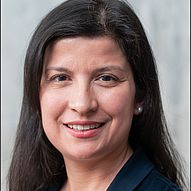
Wird geladen...
The focus of the research group is the investigation of RNA-based mechanisms of gene regulation. For our research we apply state-of-the-art techniques of biochemistry, molecular biology and cell biology. We work with viruses and the organisms yeast, mouse and human.
Motivated biochemistry or biology students have the opportunity to work on scientific projects at the Department of Biochemistry III as part of research and laboratory internships as well as bachelor's and master's theses. A detailed overview of the research carried out at the chair can be found here. If you are interested, please contact the secretariat of the Chair of Biochemistry III.
We also offer various compulsory and elective practical courses as well as lectures and seminars for students of medicine, biochemistry and biology.
Consultation hours and contact for students of medicine and dentistry
For problems of a content-related nature and specialist questions in the field of biochemistry, there are consultation hours every Wednesday from 10-11 am. Prof. Gernot Längst, Prof. Joachim Griesenbeck and Dr. Philipp Milkereit are available for this purpose.
Please make an appointment in advance and send a brief description of your concerns by e-mail.
For general and organizational questions, the course coordinator Ms. Stefanie Goldhacker will also be happy to provide information.
Courses
Courses for Medical Students and Students of Dentistry
Courses 54065 and 54066: Lectures "Biochemistry for students of medicine and dentistry A and B"
All dates and other relevant documents will be posted at the Institute of Biochemistry III and in a GRIPS course. Enrollment in the course is password protected. The link to the GRIPS course and the password will be sent to the participants by email.
Courses 54070 and 54071: Biochemical practical course and seminar for students of human medicine and dentistry
All dates and other documents relevant to the practical course will be posted at the Institute of Biochemistry III and made available in a GRIPS course. Enrollment in the course is password protected. The link to the GRIPS course and the password will be sent to the participants by email.
Courses for Students of Biochemistry
Course 54182A: Biochemical practical course II Part A for students of biochemistry
The concept of this practical course is to work on several questions within the framework of a coherent project, resembling the daily routine in a scientific laboratory. Various methods are used, with the focus on molecular biological applications. These are supplemented by genetic and cell biological techniques, as well as bioinformatic analyses. The aim is to give an impression of how important knowledge about any protein can be gained today by combining these different techniques in a constructive and time-saving way. The baker's yeast Saccharomyces cerevisiae serves as a model organism. It is equally suitable for biochemical, genetic and cell biological experiments. In addition, a great deal of additional information is available for this organism from numerous genome-wide analyses.
Methods:
In E. coli: cloning, expression of recombinant proteins. Detection via SDS-PAGE.
In S. cerevisiae: Genetic manipulation and expression of recombinant proteins. Detection via SDS-PAGE and Western blot. Affinity purification and enzymatic analysis of recombinant fusion proteins. Isolation of genomic DNA. Detection of genetic modifications via Southern blot and relative and absolute quantity determination of nucleic acids via quantitative PCR.
Further information:
The practical course takes place at the beginning of the summer semester. Participants can also enrol in a GRIPS course, in which all practical course-related documents will be provided. Enrollment in the course is password protected. The link to the GRIPS course and the password will be sent to the participants by email.
Courses for Students of Biology
Course 54232: Molecular biology project practical course with seminar
The concept of this practical course is to work on several questions within the framework of a coherent project, similar the daily routine in a scientific laboratory. Various methods are used, with a focus on molecular biology and biochemical applications. They are supplemented by modern genetic and cell biological techniques, as well as bioinformatic analyses. The aim is to give an impression of how important knowledge about any protein can be gained today by combining these different techniques in a constructive and time-saving way. The baker's yeast Saccharomyces cerevisiae serves as an ideal model organism. It is equally suitable for biochemical, genetic and cell biological experiments. In addition, a great deal of additional information is available from numerous genome-wide analyses.
Methods:
In E. coli: cloning, expression of recombinant proteins and detection via SDS-PAGE.
In S. cerevisiae: Genetic manipulation and expression of recombinant proteins and their purification, determination of enzymatic activity, isolation of genomic DNA, as well as relative and absolute quantity determination of nucleic acids via quantitative PCR.
Further information:
The practical course takes place in the winter semester in November/December.
Participants can enrol in a GRIPS course, in which all documents relevant to the practical course will be made available. Enrollment in the course is password protected. The link to the GRIPS course and the password will be sent to the participants by email.



